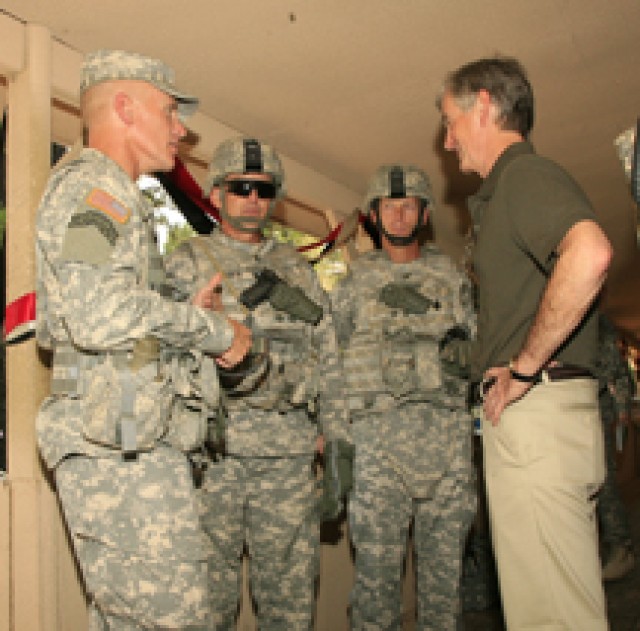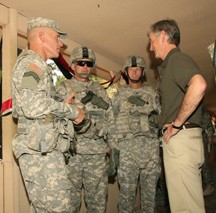FORT POLK, La. -- Fort Polk was once a mere camp for training recruits. Dirt roads, tent cities and precious little entertainment awaited those who entered old "Camp Swampy" during the 40s, and an undesirable stigma fused itself to the post. At some point, people even began speculating about the base closing permanently.
Today, the Joint Readiness Training Center and Fort Polk, formerly known as Camp Polk, is not only a premier power-projection platform, but is rapidly becoming an installation of choice -- first choice -- for many Soldiers. This is evidenced by the changes, improvements, upgrades and innovations occurring throughout post, from road improvements, barracks and housing renovations and new shopping and dining facilities to the relocation of the 162nd Infantry Brigade to JRTC to train combat advisors.
Army leadership seems to hold the post in high regard. It is therefore no surprise that John McHugh, Secretary of the Army, visited the JRTC and Fort Polk June 23 for a closer look.
Hosted by Brig. Gen. James Yarbrough, JTRC and Fort Polk commander, and Command Sgt. Maj. Jeffery Hof, JRTC and Fort Polk command sergeant major, McHugh toured Family housing, observed training and visited with wounded warriors.
"I have spent a large part of the day with General Yarbrough and his command sergeant major, taking in the full range of activities at Fort Polk. I've talked to troops that were training, talked to the roleplayers ... and saw a lot of new construction going on. It (shows) clearly that the Army feels (Fort Polk) is one of the more important places we have," said McHugh.
"We're engaged in two theaters of war," the secretary added, "sending these young heroes into those theaters to work for freedom and democracy and help our partners in Iraq and Afghanistan, so we want to make sure we're giving these Soldiers the tools and the training they need to do their jobs, but also to come home safely.
"Fort Polk is a critical part of that. The Army views this as a valuable post that will be utilized for a long, long time to come. (Fort Polk has) great people doing great work and we're very proud of them and appreciative of all they do."
McHugh said he was impressed by the quality of housing available to military families, especially for junior-enlisted personnel.
"These are beautiful facilities. I think it really shows the progress that has been made for Army Families," said McHugh. "We talk a lot about the Army Family, and it means a lot more than just a few words you read on a bumper sticker -- this is by and large a family-based Army. While (Soldiers) are wearing the uniform we want to make sure that they don't have to worry about the quality of life (of their Families). We have asked an incredible amount of these heroes and they should expect that we are going to give their Families a quality of life that is worthy of the service that they provide us."
Fort Polk's role in Army training remains relevant and essential, according to McHugh.
"It is our highest duty to ensure that the Soldiers we send in harm's way are fully prepared, and to do that you've got to put them through places like Fort Polk. The great advantages that this post has are the wide range of available training, (unique) geographic location and support of the community."
McHugh also took time to visit with wounded Soldiers in Fort Polk's Warrior Transition Unit. He said he makes a point to visit wounded warriors whenever he visits a post for the first time.
"It's important for all of us to get outside the Pentagon, put down the flip charts and talk to those Soldiers that are living the program," he said. "There's no better way to learn what you need to know than from those Soldiers. We had a great visit and I heard some pretty positive things."
The secretary also discussed recruitment and retention in the Army, stating the numbers "have rarely been as good as they are now." The 2009 goal for new Army recruits was 65,000, but that number was exceeded -- 70,045 new recruits were signed, meeting 108 percent of the Army's goal.
McHugh cited the current U.S. economic condition as an obvious factor for recruitment, but credited the excellent retention rate to the conviction of today's Soldier.
"After nine years of war, one of the advantages we have is that virtually everyone who wears that uniform knew what he or she was getting into. More and more of those who have been through (deployments) are electing to stay with us," said McHugh. "These Soldiers believe very deeply in what they're doing. They have, through repeated deployments, seen progress (and) know the hard work and sacrifice they are putting forth is making a difference and they want to see it through. They bring a passion for this nation and its ideals. While many people talk of having great pride, they (Soldiers) live it each and every day."


Social Sharing